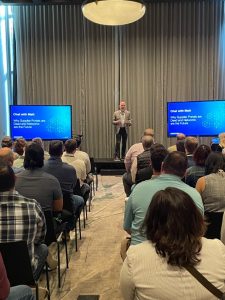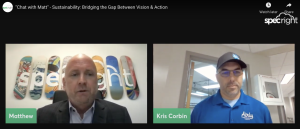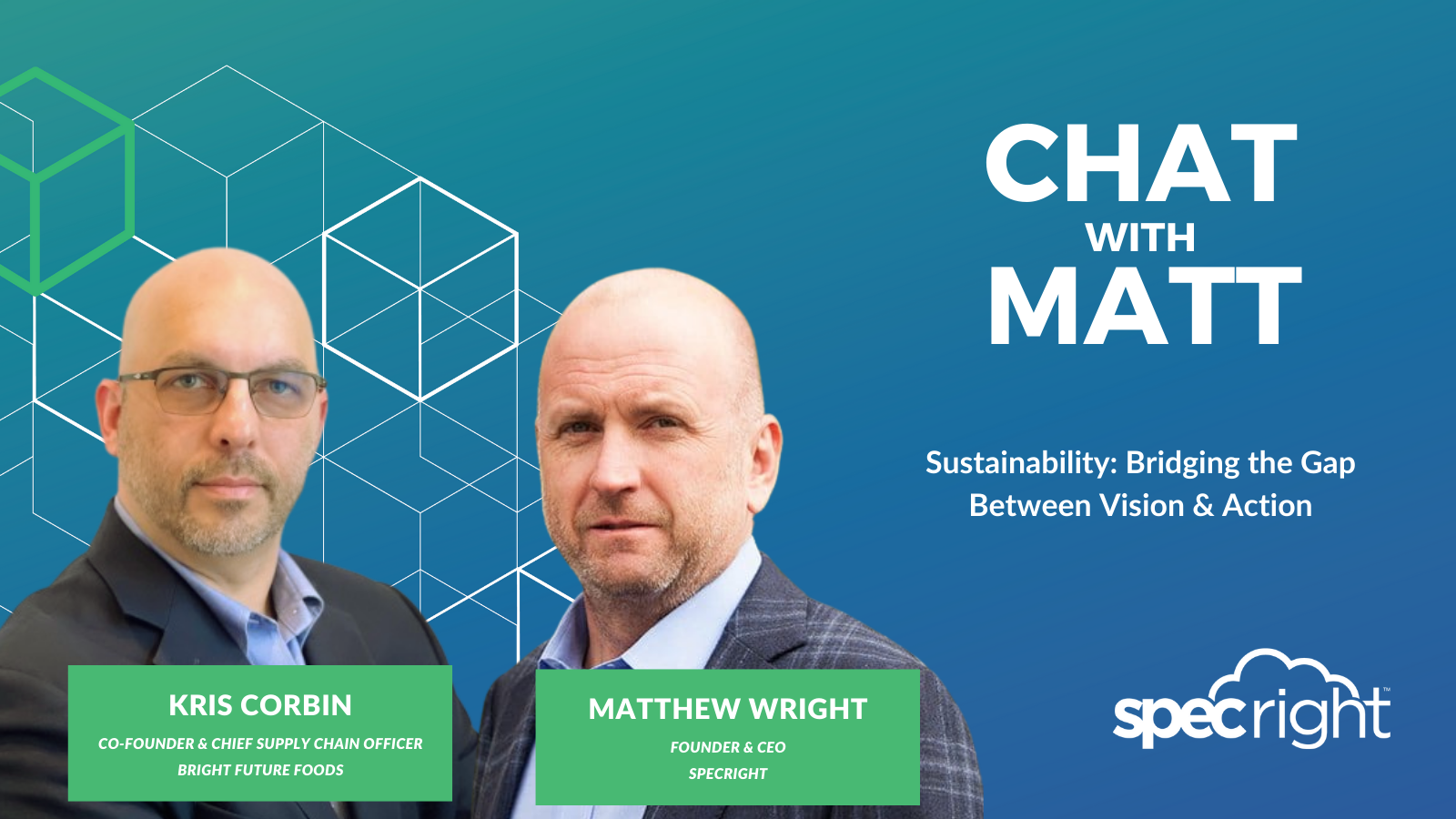Anyone who knows me, I don’t think would describe me as overly chatty. But, somehow now I host a session called “Chat with Matt.” It all began when a Specright customer asked, “Would it be possible to have an event on the first day of User Group, so we can travel in early and have some fun?”
The answer was immediately “Sure, why not?”
But, I wanted to make it valuable. And, that’s how “Chat with Matt” started.

I wanted to take a topic or trend I was interested in at the time, share some insights, and my vision for the future. I remember the first “Chat With Matt”, 20 of us gathered around a small round table talking about Specification Management.
Fast-forward to earlier this year at our Summit in Austin, Texas where 170 people gathered to hear my thoughts and engage with others on why supplier portals are dead and networks are the new future. As the year has developed, my team and I discussed expanding “Chat with Matt” to additional topics and industry trends. And with goals to increase accessibility and interactions, we recently went virtual.
In our first virtual session, I invited co-founder and chief supply chain officer of Bright Future Foods, Kris Corbin, to join in on the discussion around making sustainability a reality. Kris, and his team, are incorporating sustainable practices in everything they do. Kris was able to share why taking a spec-first approach was critical in the creation of Airly, the first carbon-negative snack food to ever be on the shelf.
If you didn’t catch the session live, you can watch the full thing here, but below are four key takeaways from the chat.

Do your Research: Regulations and Certifications
Supply chain management and sustainability are interconnected – you can no longer have one without the other. The bottom line is that sustainability can no longer be on the back-burner for companies looking to be industry leaders – consumers expect it.
But where can companies start in making a change?
The answer is following trends and keeping up with regulations. Just like many other companies, Kris said with so many different avenues to and away from sustainability, it can be hard to choose the right path.
From a regulatory perspective, Kris suggests that companies look for both credible and correct third-party certifications to ensure their sustainability claims and initiatives meet their practices. Kris and his team prove that companies can ensure proper regulations are met all while making great-tasting food.
Sustainability and Digitizing your Data
In tackling sustainability issues companies must digitize their supply chain data. “Data is what’s really driving the action,” Kris said during our chat and I couldn’t agree more.
Even as a small start-up, Kris told me how important it was for the company to have a database with all stakeholder information so that everyone was on the same page. Early on this helped the company to avoid tracking down metrics and instead focus on cost savings and driving business.
Spreadsheets and silos build a lack of transparency and poor business practices, especially with fast-growing data. For Bright Future Foods, tracking the lifecycle of data on their farms is key to their sustainability initiatives.
But it doesn’t just stop at their farms – from the factory, warehouses, and transportation, to the final packaging, the data Bright Future Foods collects in Specright’s Specification Data Management (SDM) platform gives them the means to reduce their environmental impacts.
Mapping Data Across Your Supply Chain
After data is digitized, the next step is mapping – a critical step for achieving sustainability across your supply chain. With new regulations popping up each day, companies that can easily pivot or adjust their production process, supplier network, or sourcing of raw materials will be able to implement new practices at much faster rates. From the C-Suite to the production floor, visibility of data is crucial to making sustainability changes within all departments across an organization.
For Bright Future Foods their focus is on sustainability related to their carbon footprint and climate change. By mapping out all their data, the company has been able to dissect the carbon footprint of every ingredient, package, process, warehouse, and transportation logistic of their production process. Now, the carbon footprint for each product can be analyzed and optimized in real-time versus reactively.
From DNA-level Data to Supply Chain Operation
After companies nail down the digitization and mapping of their data, operationalizing it allows companies to truly see the value of a spec-first approach. By looking at the foundational, DNA-level data of products and packaging, companies can visualize the journey toward a more sustainable future.
From Kris’s perspective, the operationalization of data is what enabled the Airly snacks to come to market and meet sustainability goals. By using Specright’s SDM platform, the company was enabled to seamlessly, “build up a database of suppliers and products.”
With a spec-first approach, Bright Future Foods is able to easily recognize what shifts in suppliers or materials will have the biggest impacts related to sustainability. In complex markets, this type of agility is what can differentiate companies with digitized, mapped data, from those still working with manual processes.
Take Control with a Spec-First Approach
The bottom line is companies who have their specification data under control don’t have to rely on third-party data that could impact their flow of operations. Having a data-driven, spec-first approach allows companies, like Bright Future Foods and others, to drive change and use data to support their sustainability claims.
As you heard from Kris, having a sustainable business model and goals to reduce carbon emissions is a profitable business model. Their goal is to be a framework for other companies looking to make a change and see sustainability as a must for the profitability of all stakeholders. And, I don’t see why any company can’t have this same mission.
If you watched this “Chat with Matt” session on LinkedIn, feel free to send me a message and let me know your feedback. If you didn’t catch it live, you click on the link below and watch the full session on-demand. We’re already planning our next session, so be on the lookout for more details soon. You can also learn more about Specright’s commitment to sustainability here.
Explore More Blogs
Get Started
With Specright’s Solution Suite, you can digitize, centralize, and link your specification data to drive efficiencies, intelligence, traceability, and collaboration within your organization and across your supply chain network.




